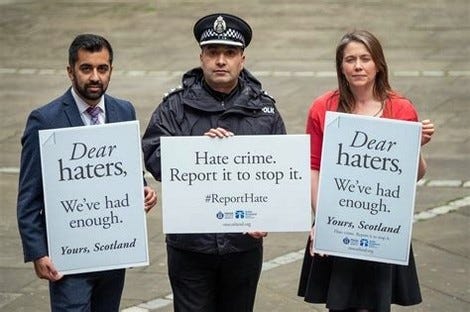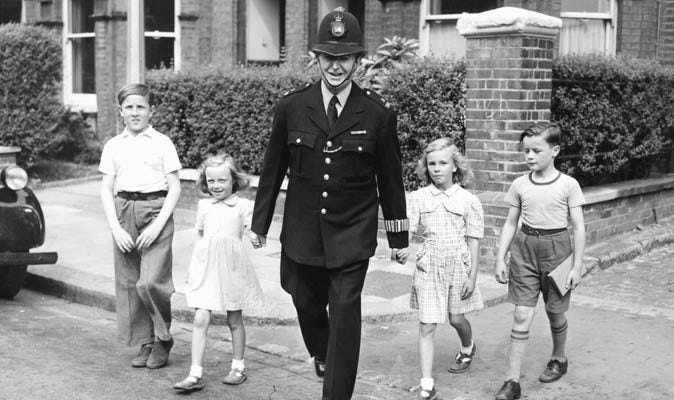Panocracy 24
Jiminy Cricket
The police are the conscience of a nation. What happens when your conscience loses its moral compass?
Middleman
Many of us have encountered Middleman some time in our lives. He pops up a lot because his type accumulate in larger organisations like the departments of government, education or commerce.
Middleman is someone who is heading for the top. He may have started his career with a novel idea like introducing some new practice into a sclerotic department or simply making himself indispensable to his boss but he's capitalised on it ever since. He has slowly and carefully crafted his empire over the years in preparation for recognition by Topman whose shoes he aims to fill one day. A seat on the Board; a professorship; an MBE; a Knighthood! There's no limit to what he can achieve by just going with the flow.
Middleman is characterised by a particular skill set: He's good at raising money (aka monies or funding) for his own little empire; he knows how to bolster his boss's ego; he's a master at never revealing his own opinions, while encouraging others to do so themselves in order to evaluate their potential as useful or otherwise in the furtherance of his career. I speak from bitter experience.
Middleman has had a personality bypass; he propagates such dictums as “Image Is Reality” and “There is no me in ‘team’” (yes, really). What he actually thinks is “four legs good, two legs better”.
Middleman may well realise that a behavioural monoculture such as the one he himself participates in is ripe for takeover but he knows he can fit into any new regime. If Topman gets it into his head that, for example, a super-deadly virus is about to hit our green and pleasant land and it can only be stopped by locking everyone up then he can count on Middleman to do the right thing.
The expression useful idiot is often used to characterise Middleman but he's not an idiot – he's a canny operator. Middleman knows exactly what he's doing. He’s not immoral - he’s amoral. In many ways he's the supreme cynic.
Which leads us to a venerable institution now heavily infiltrated by Middleman. The Police. The bobbies, the rozzers, the thin blue line, the cops, the fuzz (and other terms we all use after being caught speeding).
The Police
We humans are social animals – we rely on each other to function effectively. Our group behavioural norms have evolved along with us to prevent the breakdown of society. Most people follow the group norms most of the time :– if we all habitually cheated, for example, then no one could buy their food as no one would dare to set up a means of distributing and selling it. Modern society can accommodate a small number of liars, cheats, thieves, terrorists, politicians and so on but we all know we can't let that number get too big.
It's arguably the job of the police to act as ‘society's conscience’: to set us straight when we stray into behaviour that hurts others and which might if unchecked lead to a societal breakdown. Of course, some people want such breakdowns to occur so that they can step in and claim that they've saved us from their contrived bogeymen and thus receive our eternal gratitude (and money).
Using the Police to further political ends is not a new technique as, for example, the UK coal miners' strikes of the 1970s and 80s demonstrated. We make no other comment on the rights and wrongs of this except to say that under a panocracy, the will of the people could easily have been ascertained before things degenerated into violence.
The people who make laws which are to be obeyed by us seem to think they know what bad behaviour is. When it comes to their own bad behaviour those same laws seem much more … nebulous
As well as that, what is currently good behaviour can rapidly become bad behaviour, the definitions apparently blowing with the fickle winds of political fashion.
The police find themselves caught in the middle of this. Policing, like many other functions in our civilised society, has become politicised. It didn't start out that way.
Ancient Policing - Hue and Cry
Before the 19th Century, policing was pretty informal and catching criminals had been the responsibility of all able-bodied citizens. When a crime was spotted a hue and cry was set up to catch the miscreant.
A professional police force was established by the city of Glasgow in 1800 although some of its functions had been carried out by night watchmen for centuries before that.
London followed suit in 1829 when the metropolitan police force was created with paid constables in natty tail-coats and top hats so as not to resemble a military force. Even in those days, there was considerable suspicion that the police would be used to spy on citizens so the police were required to wear their uniforms even when off-duty to allay public fears. (That public officials should always be identifiable is still quite an attractive idea).
Of course, things have moved along since then.
Modern Policing and Political Interference
Certainly in the UK, the policeman used to be seen as the 'bobby on the beat' – someone who would happily help a lost visitor or stop the traffic for an old lady crossing the road. A bobby could exercise his discretion and was well-respected by the law-abiding community.
How things have changed.
“There are 48 civilian police forces in the UK: 43 territorial police forces in England and Wales, a national police force in both Scotland and Northern Ireland and three specialist police forces (the British Transport Police, the Civil Nuclear Constabulary and the Ministry of Defence Police).
Data from the Crime Survey for England and Wales (CSEW) suggests that around 55% of people think their police force is doing a “good” or “excellent” job. This figure is often known as the confidence level. The confidence level has fallen over the last two years (from around 62% in 2017/18 to 55% in 2019/20).” - Policing in the UK
So nearly half the population (and rising) of the UK think their police aren't doing a good job.
The first thing to say is that most people aren't much concerned about 'policing models' or benchmarks against arbitrary standards dreamt up by bureaucrats especially when the police are seen to be acting according to ideological biases and political pressures.
It seems that the police themselves, or at least the Middlemen within their ranks, have bought into the negative propaganda directed against them and their institutional takeover by Middleman has led to these new unpopular behaviours.
The public are concerned about the apparent attention to trivial matters at the expense of dealing with serious ones.
When two women were arrested and fined for going for a walk during the Covid hysteria, it sent the message that some officers were prepared to act like agents of State Security and confirmed those Victorian fears of a creeping assault on our liberty.
That they later apologised and withdrew the fine was the result of public outrage and 'new guidance' from on high rather than their own common sense and perspective.
The introduction of Police and Crime Commissioners in 2016 in England and Wales further extended the reach of politics into policing.
It apparently hasn't done much good as the above survey and countless negative reports bear witness – as well as rising crime figures.
The Commissioners are openly partisan – elected on party political tickets - and their responsibilities include “Setting out a force's strategy and policing priorities through the Police and Crime Plan” - a blank cheque for political interference if ever there was one. So now we have regular skirmishes to decide which ideology controls the soul of the police force. I'd be surprised if the bobby on the beat is much on board with this and you may well know a lot more it.
A panocracy might conceivably have Police Commissioners but their roles would be strictly administrative and political interference in the running of the forces would be absolutely verboten.
It's not hard to imagine an effective system for the oversight of police activities. Like other agencies, the police must have an administration that's on one hand compelled to do what the panocracy decides and on the other prevented from engaging in politics itself. So if the crime figures go up and the panocracy decides (via the usual procedures) that more bobbies need to be on the beat and fewer of them should be stuck behind a desk then the administration will have to do it. Of course, if that leads to worse crime statistics then the panocracy will have to think again. There won't be a shortage of ideas and cogent debate.
Back in the Dock
If we want the police to be a force that people can trust (and we do) then we, in concert, have to compel them to modify their culture, organisation and activities. The complete separation of police and politics is a major part of the remedy. Like the armed forces the police must operate with openness and resist attempts to influence them by political, commercial or ideological interests and we have to give them the means to do that.
This would be a lot easier in a panocracy – where career politicians and commercial concerns can no longer cynically manipulate agencies like the police to further their own aspirations.
Perhaps Dixon could return to Dock Green.
“Evening all” - as the avuncular “copper’s copper” George Dixon would have said.








And it would be nice if the police reverted to looking more like the avuncular Dixon of Dock Green and less like wannabe members of a SWAT team